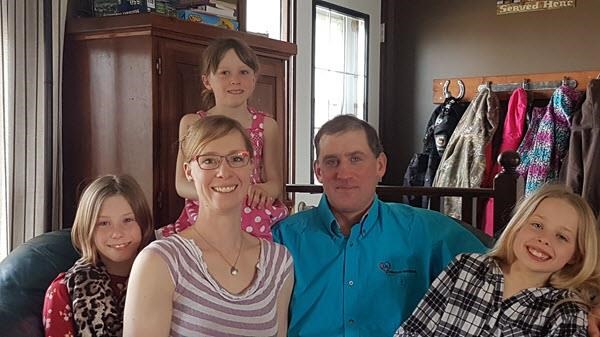The Lovichs have a 70-cow operation near Balgonie, Sask.
By Diego Flammini
Staff Writer
Farms.com
A farming couple from Balgonie, Sask. have been named Saskatchewan’s Outstanding Young Farmers for 2021.
Michael and Jessica Lovich received the award during the Saskatchewan regional event on June 22.
“It was pretty cool and definitely an honour,” Jessica told Farms.com. “It was very humbling too because we’ve gotten to know some past winners. To be included in that kind of company is special.”

Michael and Jessica Lovich surrounded by their children Reata (left), Raelyn (behind) and Renelle.
Both Jessica and Michael grew up on dairy farms in Alberta and briefly farmed with Michael’s parents. In 2015 the couple moved to Saskatchewan to start Lovholm Holsteins.
The 70-cow operation focuses on breeding conformationally superior animals.
“That means we’re breeding for traits in their conformations (like) good feet and legs, superior udder quality and other functional traits of a cow and what they look like because longevity is one of our focuses here,” Jessica said. “We also select for some production traits when we’re breeding.”
In their six years of farming in Saskatchewan, the Lovichs have tried to diversify their operation.
Some areas of diversity come from the dairy herd.
“We sell genetics, raise replacement animals, sell embryos or live animals,” Jessica said. “Our kids are the other driving force of diversity on the farm.”
Michael and Jessica have three daughters: Reata, Raelyn and Renelle.
And the young farmers are wanting to raise livestock of their own.
“They have a small herd of beef cattle they’re raising and last year they invested in pigs, so we’ve got a handful of pigs that (the girls) sell to friends, neighbours and family right now,” Jessica said.
In addition, the Lovichs put an emphasis on ag education.
The farm has hosted virtual school tours during the pandemic and hosts in-person tours when allowed to do so.
Showing kids how food gets from farm to table is important because these young children will grow up to be consumers, Jessica said.
“We know there’s a disconnect today and it’s important for people to understand the industry and how food is produced,” she said.
As important as how food gets to a table is finding out why farmers make the decisions they do.
Not all farms are the same and it’s okay to ask questions, Jessica said.
“There’s a reason why a farmer is doing something the way they are,” she said. “It’s important that we as farmers explain these decisions so people can have all the right information they need.”
Jessica and Michael and honorees from six other Canadian regions will compete for the title of Canada’s Outstanding Young farmers in December.